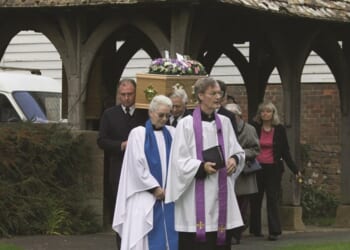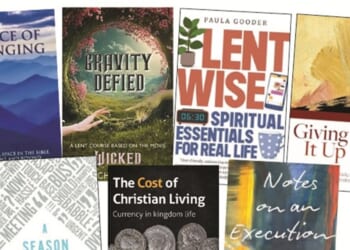Spiritual exercises
OUR four children and their spouses come to stay, and that means our grandchildren, too. Being a grandparent is God’s gift of a second chance at parenting, with all of the love and fun and very little of the hard work — like some sort of non-taxable pension for the over-60s. (Having said that, there probably will be a tax on it before long.) Our grandson is about to turn four, and, while he’s keen on Grandpa, he adores Nana, partly because my wife spends so much time with him, but also because she’s just so much nicer than me.
She’s also a cradle Roman Catholic, and, as far as possible, a daily communicant. Our grandson has heard her say “Cheerio! Off to mass. Won’t be long” most mornings, and yesterday he suddenly announced, “’Bye. Off to mass. See you soon,” and promptly went to his room.
We asked him later what he did at this mass. His reply? “Stretching.” I told my wife when she came home. “Stretching towards God,” she said. “I rather like it.”
Quiet time
I GREW up in a secular, non-Christian home, and, while Christmas was deeply significant — it meant gifts, a plastic tree brought down from the loft, holidays from school, and lots of food — Advent was something of a mystery, in every sense. The only reference I remember was on the extraordinarily popular Blue Peter television programme, where the presenters would make and light an Advent crown.
Today, such religious exclusivity and unobserved fire-safety laws would probably lead to an armed-police raid and reactive headlines in the Daily Mail, but back then the innocence and charm of it all was overwhelming.
Advent was obviously special, but I wasn’t sure why. Today, I cherish the time of waiting and watching, the expectation as important emotionally as it is theologically; and, the older I become, the more I understand that need for pause, space, and reflection.
The number of our days
THAT is a challenge for clergy in the weeks leading up to Christmas, of course, and, apart from the usual Christmas Eve and Christmas Day eucharists, I’ve had a great many home-communion visits to arrange and long-term care services to lead.
Care homes can vary enormously, from the private and even bucolic — echoes of The Thursday Murder Club — to the basic and clearly under-financed. The level of care and devotion is consistent, however, and there are few people who impress me as much as the staff who work all hours, often for limited compensation, in these vital places. They are usually fairly young women, often from immigrant families, and, if ever I need a reminder of what it means to live with a servant heart, I need only to look at their dedication.
Last year, one of the staff told me that an elderly man in a wheelchair had asked to speak to me after the service. Of course. We sat together as he chatted about his life. His wife had died two years before, there were no children, and his friends had either gone or were too ill to visit. Yet there was no self-pity here: more a dignified resignation, or perhaps contentment. “This will be my last Christmas,” he said. “I’m happy at that. No complaints.” I said that I’d visit him in the New Year, and that I was sure he’d be fine.
He died on Boxing Day. It is not the first time that I’ve encountered people who seem to know when their lives will end.
Gospel of good news
I CAN’T pretend that I can look back at 2025 without deep worry and concern: so many international threats and so much instability. There were wars and massacres; hateful ghouls I had assumed long-exorcised haunting public discourse; and dangerous toxins pumping their way into the body politic. How did people feel in 1914, 1940, or during the 1960s, when the threat of nuclear war was so pervasive?
One of the differences, I think, is that, back then, the reporting of news was a unifying factor. There were very few sources, but most of them were considered reliable and ethical. Today, we have myriad platforms, and so many of them are extreme and dishonest. We’ve lost trust and embraced cynicism, and that causes only harm. Christ isn’t a hiding-place from all this, but is an anchor, gluing us to eternal truths and permanent things. Not sure if I could cope otherwise.
Common target
THERE is a belief that C. S. Lewis made a point of never reading newspapers, but that’s not entirely true. He read them when major events were taking place, but, in general, assumed that people would tell him what was newsworthy, and didn’t want to become muddied in what he regarded as the transitory importance of world events. I wonder how he’d cope today?
I’ve little option, because I’m a journalist as well as a priest, and am a columnist for Canada’s most popular newspaper. I recently wrote about Layan Nasir, a young Palestinian Anglican woman who has been repeatedly and unjustifiably imprisoned by the Israeli authorities (News, 17 October). When the column appeared, a strongly pro-Zionist website launched a campaign against me, and sent angry letters to my editor. Simultaneously, a pro-Palestinian activist condemned me for being insufficiently critical of Israel. I suppose I should count all this as a victory.
Free spirits
AT A Christmas market, a friendly woman sees my collar and approaches. Without introducing herself, or giving me time to do so or to say anything at all, really, she rapidly explains that she considers herself to be deeply spiritual. My problem with this oft-heard statement — usually accompanied by “I’m not religious but. . .” — is that it often has no authentic meaning. I’ve never had anyone tell me that they’re not spiritual because, within contemporary Western culture, that would be a confession of failure.
I don’t think I was being curmudgeonly (“I bet you were,” says my wife, later), but I responded by politely asking my new acquaintance what she meant by the word. “Well, there’s no need to be so aggressive about it,” she replied, and walked off to inspect the mulled wine stall.
I felt a little guilty about it all; so, on the way out, made a point of walking up to her and saying in my kindest tones, “It was nice chatting. Have a wonderful day and a good Christmas.” There was a pause, then, from the spiritual lady. “It may be Christmas for you, but don’t assume that it is for me.”
I was about to explain that it was Christmas whether one believed in it or not, but thought better of it. Advent thoughts, Michael, Christian thoughts.
While there’s life
BY THE time you read this, we will be entering 2026. May it be a better year: a year when gospel values turn the world upside down, the permanent revolution of love dominates, and the heart is set free. And I genuinely mean it when I say, God bless the spiritual.
The Revd Michael Coren is a journalist, and a priest in the Anglican Church of Canada.
















